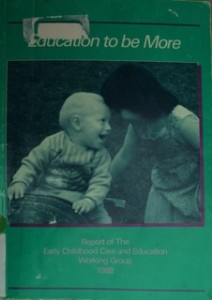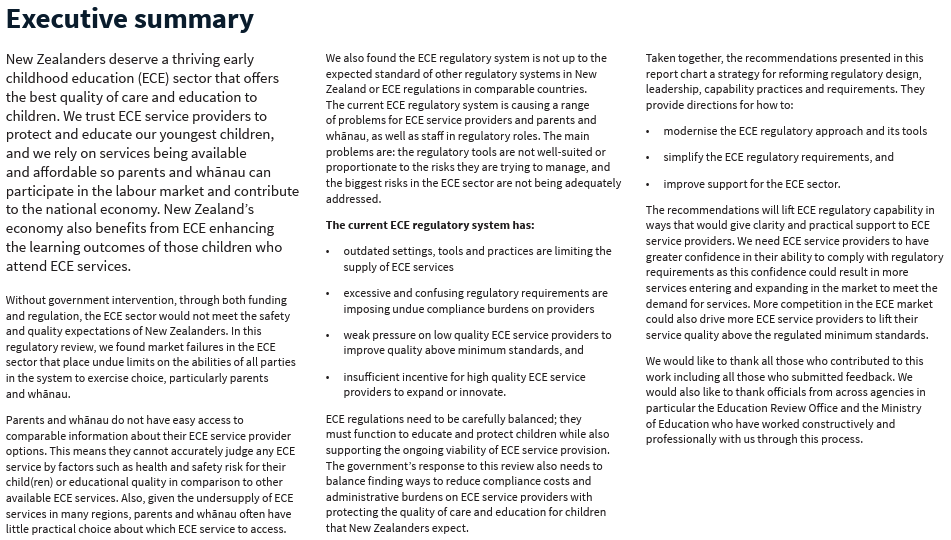In 1980, Geraldine McDonald wrote: ‘Measures to promote the rights of children are frequently disguised ways of controlling the role of women.’ McDonald’s challenge to policymakers is cited in the 1988 report of the Early Childhood Care and Education Working Group, Education To Be More (a.k.a. the Meade Report).
It’s on page 40, in a discussion of the enduring challenges that the early childhood sector has faced. The quote provides something of a prophecy: that the early childhood care and education care and education sector will continue to fail women and children by pitting one against the other in, for example, early childhood regulatory reviews.
Education To Be More recognised many enduring challenges, visions and strategies for the early childhood care and education sector. Some strategies, such as a national curriculum and the maximisation of participation, are now more or less entrenched in the sector’s policy and perhaps even in the nation’s psyche – although, of course, with many enduring concerns and debates about teacher qualifications, working conditions, the quality of initial teacher education and the translation of the strands, principles and learning outcomes into practice.
However, those concerns and debates are not the concerns and debates of interest in this brief commentary. They certainly interconnect with what I see as a vital debate.
The problem we need to recognise as a nation is that the recent regulatory review (summary) is doing exactly what Geraldine McDonald said it should not be doing. A regulatory review can function as control through a proliferation of more restrictions and requirements that operate on a low-trust, high-surveillance approach to governing early childhood teachers (leading to more and more reporting and more and more pressure to spend a day in fear of not meeting the regulations). A review can also function as control by releasing the investment sector from the burdens of regulations (a scenario which could, in many instances, contribute to poorer working conditions and pay). Neither of those possibilities is particularly productive and empowering for early childhood teachers.
An open letter to the Prime Minister and Cabinet argues that the regulatory review does challenge the idea of children being leveraged to control women because there’s not much about the review that suggests an actual concern for the lives of children. In addition, the letter argues that the review has been ‘dismayingly’ lacking in consultation and public debate. The review is controlling, in other words, through its impoverished approach to being inclusive, deliberative, and hence democratic. That impoverishment is likely to also lead to a failure in empowering the sector because it’s so intensely disengaged from the sector.
The life and times of Education To Be More offer policymakers insight into how and why to think differently about a regulatory review and what early childhood teachers should expect of policy that impacts their lives and the lives of those with whom they work.
Between 1988 and 1996, the nation came together and produced a curriculum – the leaders of that policy process established an exhaustive and participatory approach to policymaking.
The perceived success of the curriculum in the 1990s is a hard-fought benefit that acknowledges the incredible efforts of many individuals and groups – notably the leaders who recognised a simple emancipatory possibility – that policy can be meaningful when it is inclusive and deliberative.
In other words, the success was an inspiration in bringing the nation together in a slow and considered approach. This includes all the teachers who contributed their experiences and perspectives to the nationwide consultations and reviews and who could implement the new curriculum as active participants who had a sense of belonging in relationship to their contribution. This process is particularly important in the early childhood care and education sector because so many tensions create apparent divisions, factions, interest groups, and so on. The complexity of the sector demands a slow and careful and inclusive approach.
Consider the benefits of this process-focused approach to policy in terms of being ‘on board’ and ‘living’ the regulations. Consider also that the regulatory review could be an excellent time to celebrate the successes of the early childhood care and education sector in Aotearoa New Zealand. This is where the 2017 curriculum updates and, more now, the regulatory review, are missing the essence of what makes policy work.
Success is not in the product; it’s in the process!




